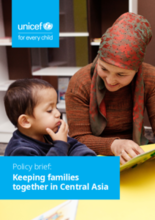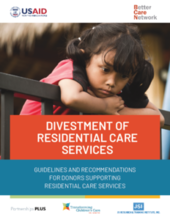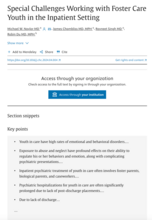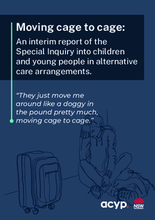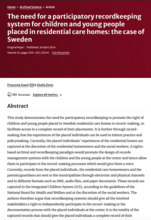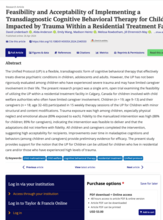Displaying 31 - 40 of 1510
This UNICEF policy brief finds that an estimated 203 children for every 100,000 children live in residential care across Central Asia – almost double the global average of 105 per 100,000. In this brief, UNICEF proposes seven policy recommendations to facilitate the closure of large-scale institutions and transition to family-based alternatives to institutional care in Central Asia.
These guidelines have been written to guide donors and partners through the process of gathering information, making the decision to divest, securing buy-in internally for divestment, engaging with partners and stakeholders, developing a divestment plan, communicating that plan, and addressing any child safety concerns.
In this interview, BCN’s Senior Technical Advisor, Rebecca Nhep, speaks with Phil Aspegren, Founder of Casa Viva, about transitioning residential care services with child sponsorship funding models.
This article details to unique challenges faced by youth in care in the US when receiving inpatient treatment and how that varies in several ways from the care of non-foster care youth. Children in care have more medical, behavioral, and psychiatric problems and require health care at higher rates than youth not engaged in the child welfare system.
This is a tool that ensures all components of child protective care: health, adequate nutrition, care, safety and early education, through the intersectoral collaboration between the Ministry of Labor and Social Protection, the Ministry of Health, the Ministry of Education and Research and local public administration authorities.
Foaia de parcurs pentru încetarea plasamentului copiilor din grupa de vârstă 0-6 ani în îngrijire rezidențială este un instrument care asigură toate componentele îngrijirii protectoare ale copilului: sănătate, alimentație adecvată, îngrijire, siguranță și educație timpurie, prin colaborarea intersectorială dintre Ministerul Muncii și Protecției Sociale, Ministerului Sănătății, Ministerul Educației și Cercetării și autoritățile administrației publice locale.
This interim report based in Australia focuses on hearing the lived experiences of children and young people in alternative care arrangements and lifts up the voices of those who have participated in private hearings as part of this Special Inquiry to date.
A scoping review on the short-term (during care) outcomes of residential care at the user level (children and their families) was conducted.
This study demonstrates the need for participatory recordkeeping to promote the right of children and young people placed in Swedish residential care homes to record-making, to facilitate access to a complete record of their placements. It is further through record-making that the experiences of the placed individuals can be used to inform practice and policymaking.
This research project was an open trial examining the feasibility of utilizing the Unified Protocol (UP) -- a form of cognitive behavioral therapy -- within a residential treatment facility in Calgary, Canada for children involved with child welfare authorities who often have limited caregiver involvement.

